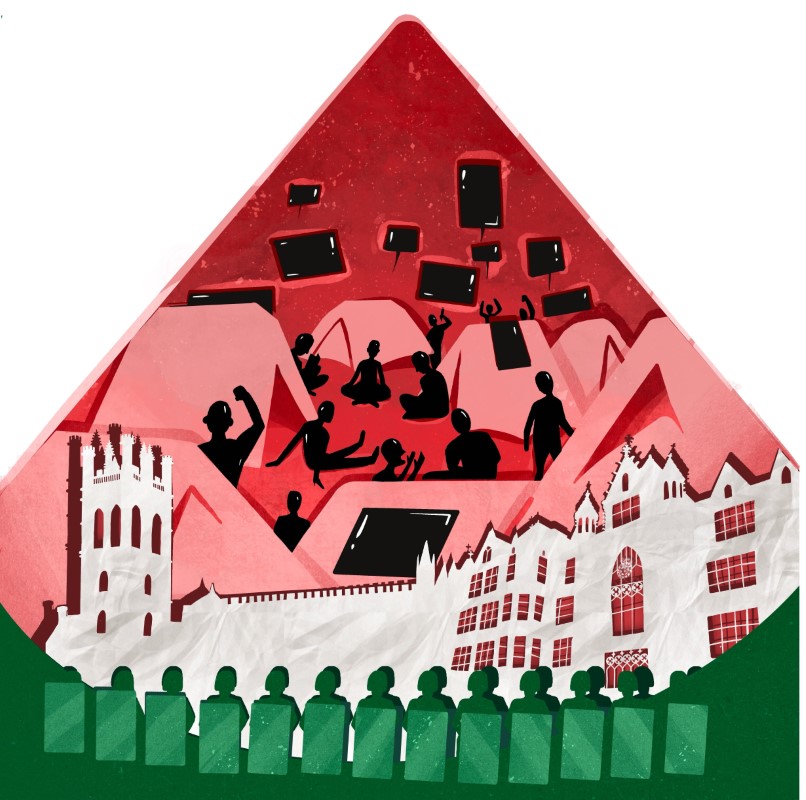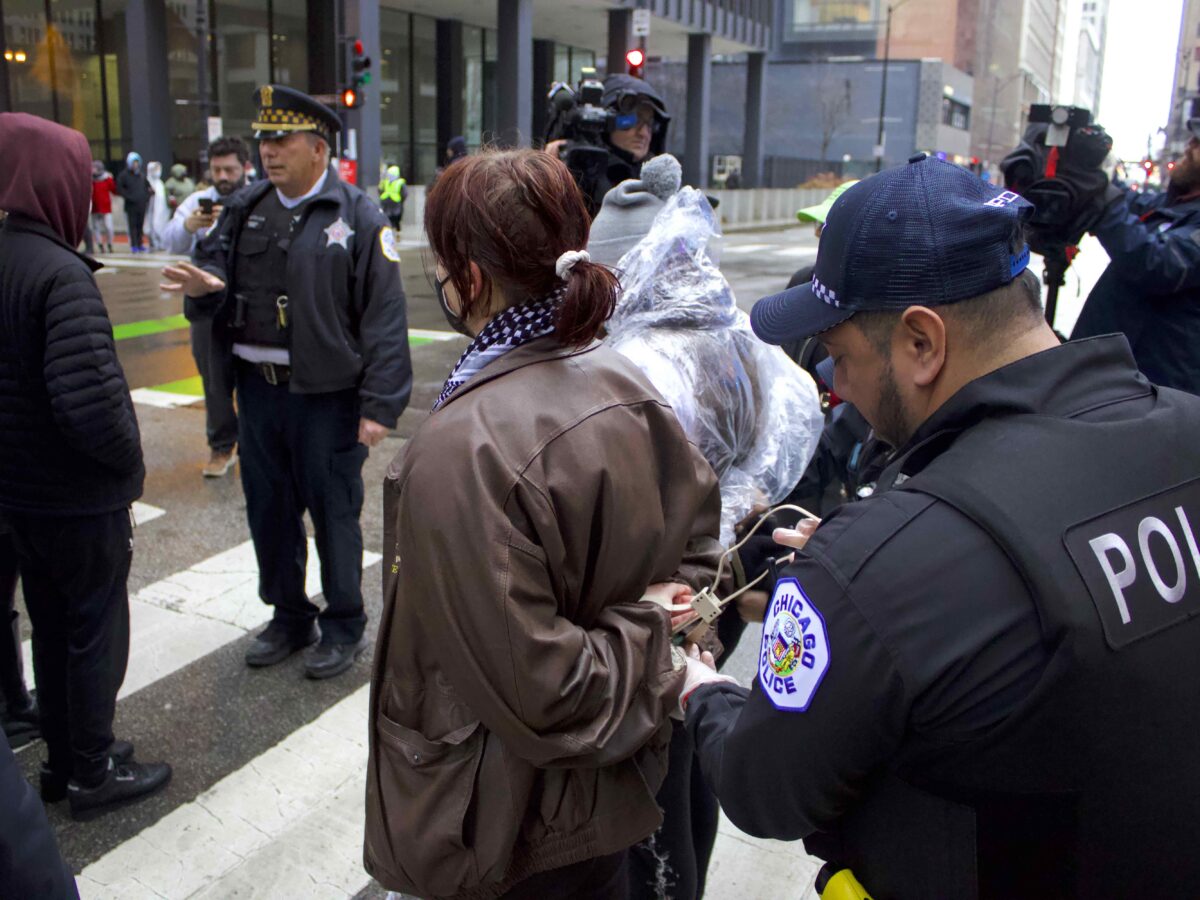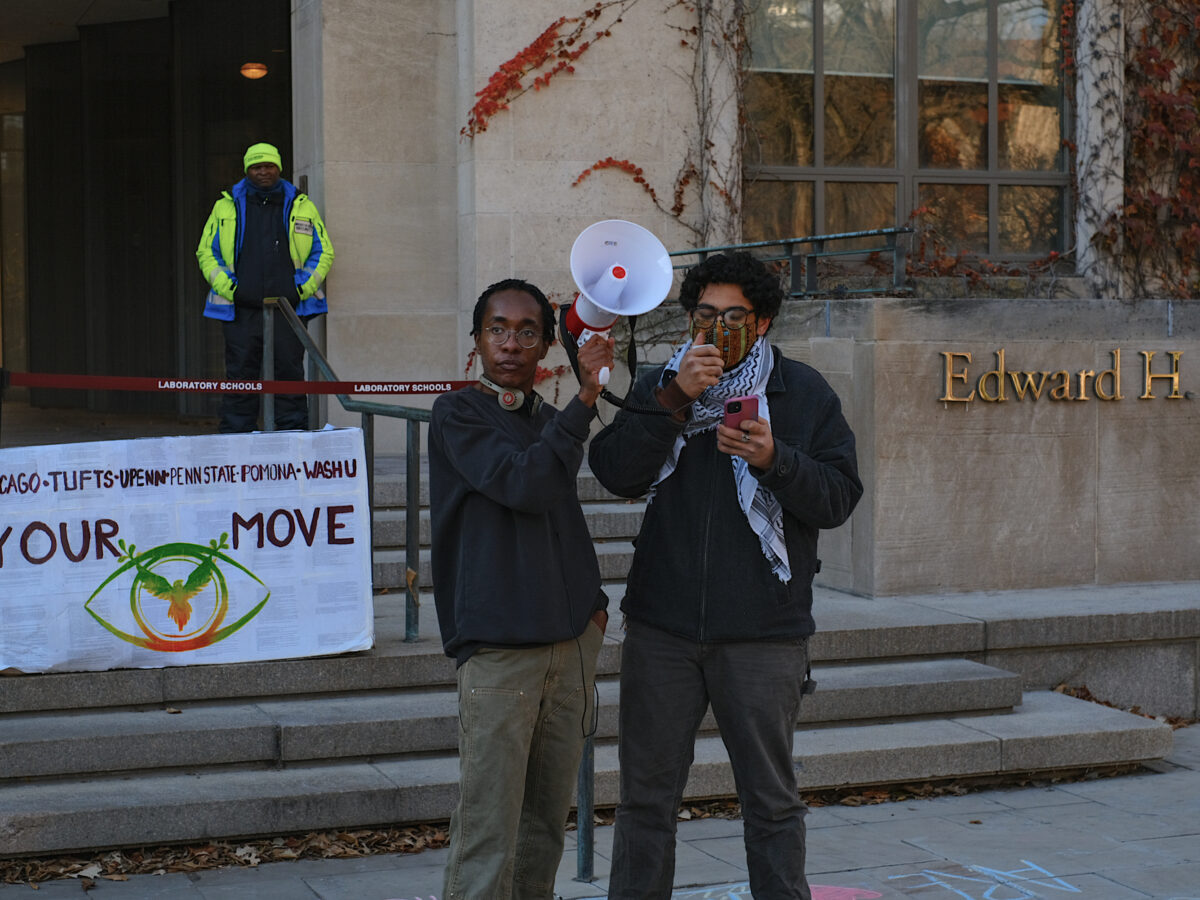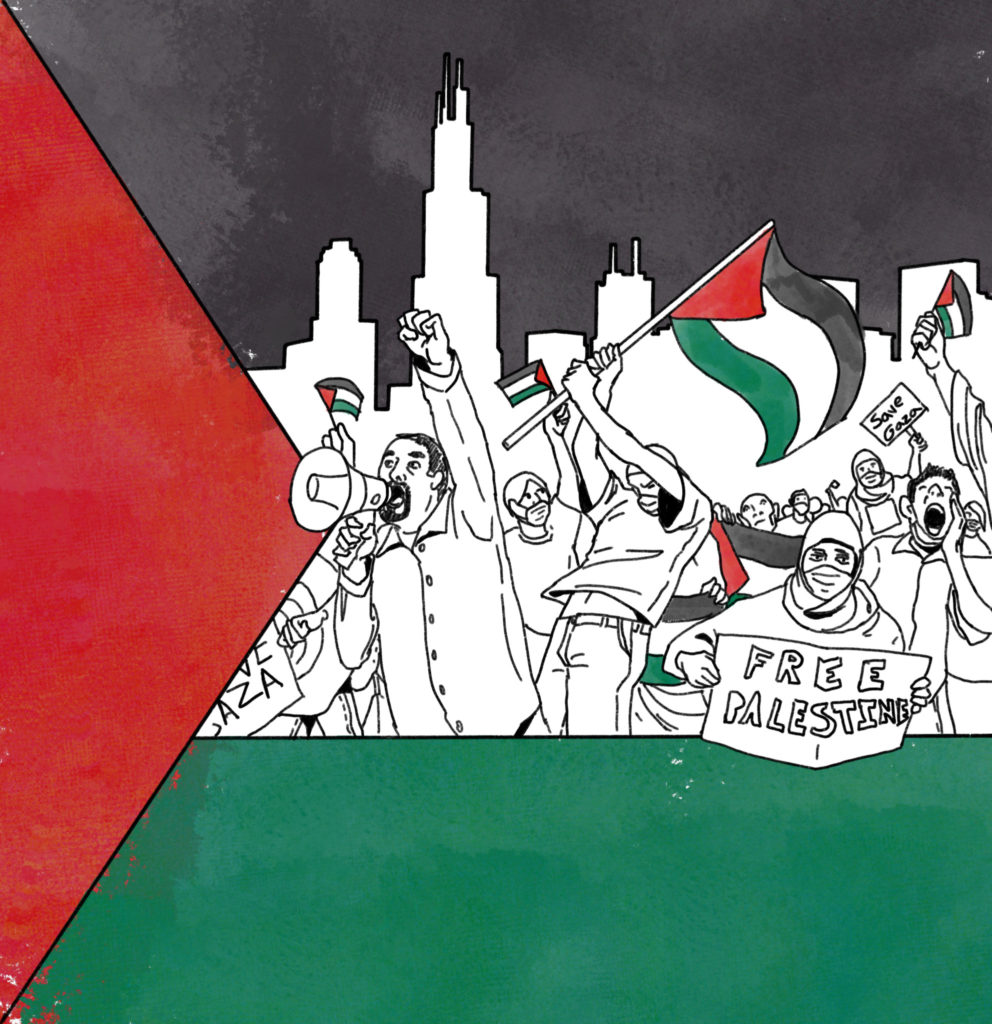Before dawn on Tuesday, University of Chicago police (UCPD) raided and cleared a Palestine solidarity encampment that had occupied the campus quadrangle for eight days. Students erected the encampment on Monday, April 29, joining a national wave of similar demonstrations on college campuses and demanding the university divest from companies with ties to Israel.
The U. of C. encampment followed dozens of others at universities across the country and around the world. Student protesters have called for their universities to divest from the war on Gaza, namely financial investments in weapons manufacturers and academic partnerships with Israeli institutions, since October 2023.
Since Hamas launched Operation Al Aqsa Flood on October 7, killing over 1,100 people in Israel, the Israeli Defense Forces (IDF) has sustained a counterattack in the Gaza strip that has killed more than 34,100 Palestinians, displaced nearly 2 million people, and destroyed more than 60 percent of homes. The IDF has also destroyed bakeries and farmland, and restricted the flow of international humanitarian aid, leading to more than a million Palestinians in Gaza experiencing catastrophic food insecurity. Cindy McCain, the director of the United Nations World Food Program, said on May 4 that there is a “full-blown famine” in the north of Gaza that is spreading southward.
In January, the International Court of Justice (ICJ) found it “plausible” that Israel’s ongoing assault violates the Geneva Conventions against genocide. Student protesters and United Nations experts have also decried “scholasticide”, the systematic obliteration of education; some 80 percent of school buildings in Gaza have been destroyed, and nearly 6,000 students and teachers killed.
Despite the ruling by the ICJ, which prescribes steps for Israel to de-escalate its assault, Israeli Prime Minister Benjamin Netanyahu approved an invasion of Rafah, where over 1 million Palestinians are currently displaced due to the siege.
The U.S. has provided a steady flow of military aid to Israel, amounting to approximately $300 billion since its founding in 1948. In 2019, a new ten-year contract was formalized to send $3.3 billion to Israel per year under the Foreign Military Financing Program, which requires Israel to spend a majority of the conditioned aid on U.S. goods and services. According to a 2023 report published by the Stockholm International Peace Research Institute, 69 percent of all Israeli weapons imports come from U.S. firms. On April 29, Amnesty International released a research briefing documenting how the use of U.S.-made weapons by Israel in Gaza is in violation of both international and U.S. law, demanding an immediate suspension of the transfer of arms.
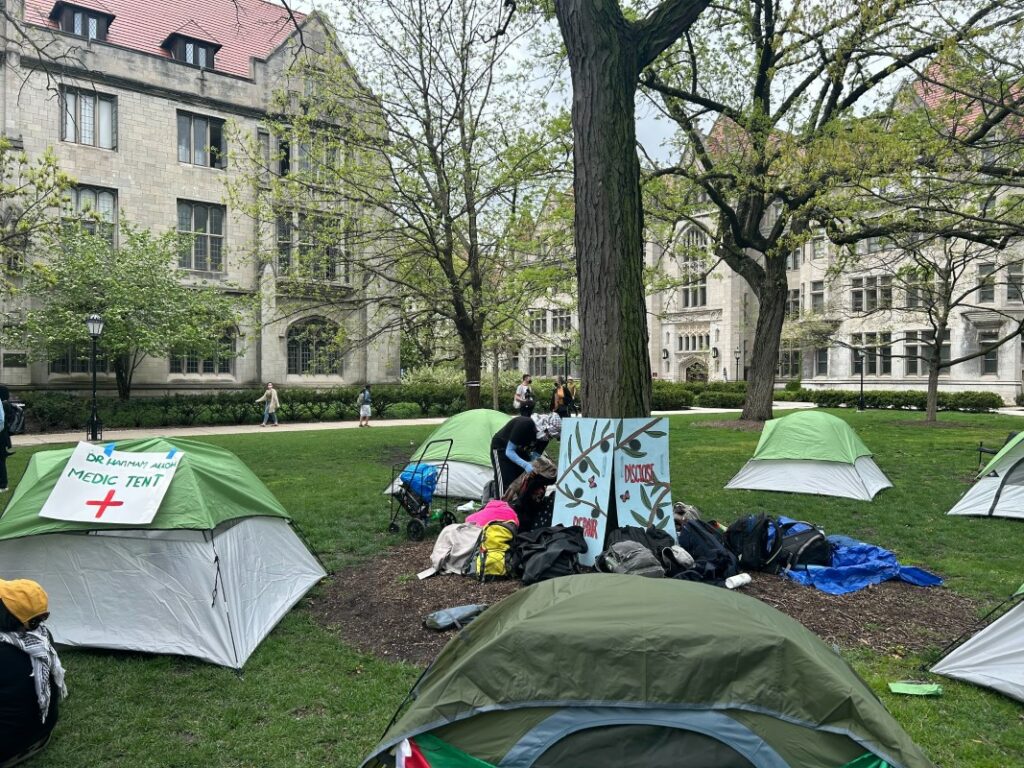
Like hedge funds, universities invest in stocks by allocating a percentage of their endowment fund in order to generate a profit. The student movement for divestment follows similar tactics to the Boycott Divestment, and Sanctions (BDS) movement, which aims to sever economic ties to institutions perpetuating the Israeli occupation of Palestinian territories. When university students participated in a similar movement during South African apartheid, it led to U.S. universities divesting billions of dollars from firms participating in apartheid and helped mobilize a wider movement against apartheid.
After months of student protests, rallies, walkouts, and sit-ins calling on university administrations to be transparent around investments and to cut all ties with Israel, the student movement escalated their protests by building encampments in public university spaces, beginning with Vanderbilt University on March 26, and taking off after students at Columbia University began camping on April 17.
Since then, protests have rippled out to universities with some of the biggest endowments, such as Yale and Harvard. As of May 3, the encampments have expanded to 16 countries spanning nearly every continent.
In Illinois, students have also set up encampments at Northwestern University, the University of Illinois in Urbana-Champaign, DePaul University, and the School of the Art Institute of Chicago (SAIC).
UChicago United for Palestine (UCUP) organized the encampment. The coalition includes Students for Justice in Palestine, Chicago Against Displacement, Environmental Justice Task Force, the National Lawyers Guild, Faculty for Justice in Palestine (FJP), Dissenters, Care Not Cops and others.
The coalition has three demands: That the university disclose its investments, budget, and holdings; that it divests from weapons manufacturers by withdrawing funds and from Israeli institutions by ending partnerships; and that it repairs the damage done by funding the reconstruction of Palestine’s education system, beginning with Birzeit University, which is located in the West Bank but was damaged in an Israeli raid last year. U. of C.’s endowment, as of last year, was $10 billion.
The group connected the genocide in Gaza with both the decades-long gentrification of Black residents on the South Side and the burning of fossil fuels, of which students also call for disclosure, divestment, and reparations.
“Both Black South Siders and Palestinians are being displaced and forced to live in tents in a modern apartheid with no community, no shelter, and no safeguards,” said an organizer with UChicago Against Displacement at an April 26 rally before the encampment went up.
“The fossil fuel industry and the military industrial complex are fundamentally intertwined,” said an organizer with the Environmental Justice Task Force, who noted that U. of C.’s Board of Trustees chairman, David Rubenstein, is also co-chair of the Carlyle Group, a private equity firm invested in two dozen oil and gas companies. “The purpose of the military and militarism is to preserve the extractive economy—an economy and political system in which the U.S. and its western imperialist allies can have complete access to the natural resources and labor of the global south.”
As part of their calls for reparations, the students also called for the abolition of U. of C.’s private police force and the reallocation of those funds to invest in housing and education on the South Side.
“All these things are tied. We can’t acknowledge the impacts the university has in terms of the genocide of Palestine without recognizing the impact that they have on the community that we’re occupying,” said Youssef Hasweh, an organizer with Students for Justice in Palestine. “Whether we like it or not, our [issues] are so intertwined and embedded with other social issues and movements, which have been going on for years.”
According to a 2020 report by the Chicago Maroon, U. of C.’s investment portfolio has ties to fossil fuels, weapons manufacturers, and deforestation. A 2023 Amnesty International report gave the university a failing grade on the alignment of their financial investments with the UN’s Guiding Principles on Human Rights.
The administration has resisted calls for divestment thus far in all these fronts, including during an academic boycott of Israeli universities in 2013 and a business divestment from Israeli companies in 2016. In each of these instances, administrators have deferred to their position of neutrality toward political issues in the Kalven Report, written in 1967 during protests against the Vietnam War.
In response to a request for comment from the Weekly, a U. of C. spokesperson reiterated the Kalven Report, highlighting a quote in the document: “The university is the home and sponsor of critics; it is not itself the critic.”
UCUP organizers have responded by stating that investing is in itself a political act.
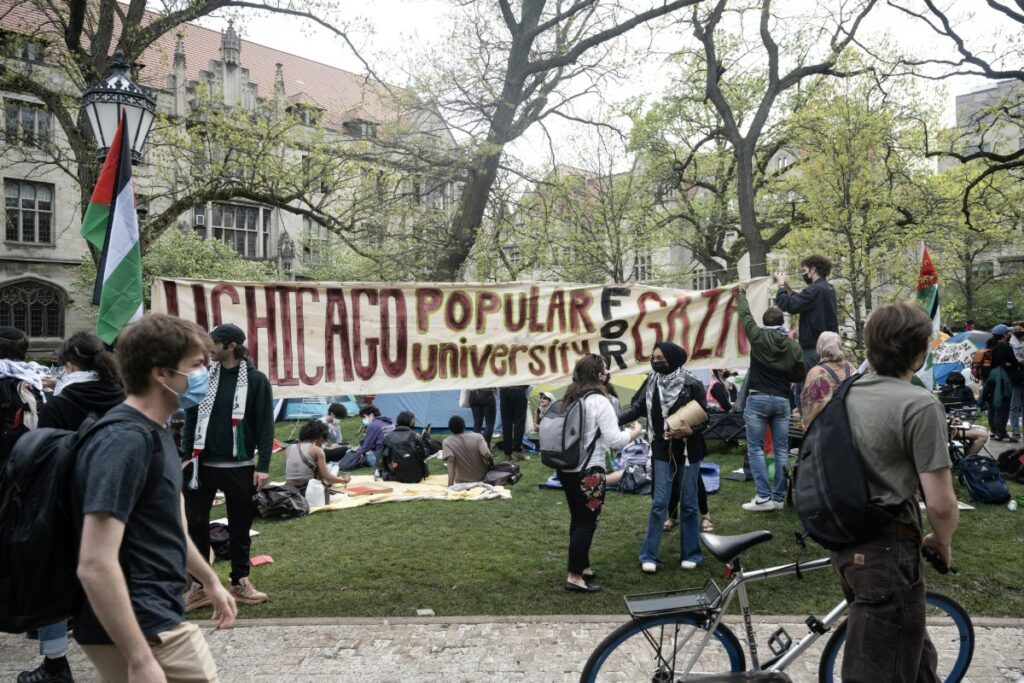
University administrators have largely followed Columbia’s precedent in how they’ve responded to these demonstrations. Some schools, such as Northwestern University and Indiana University, have altered policies specifically to prohibit the Gaza solidarity tent camps. Scores of students have been suspended and evicted from student housing around the country. It’s unclear as to whether or not expulsions will follow.
Many administrators deployed police to arrest and detain student demonstrators, and in some cases arrest faculty who were defending students. On the morning of April 30, Columbia President Minouche Shafik authorized hundreds of NYPD riot police to raid that university’s encampment. The ensuing sweep of the tents and an occupied building resulted in 108 arrests, which one reporter described as “brutal.” At UCLA, campus police, LAPD, and the California Highway Patrol swept the camp and shot demonstrators with less-lethal projectiles. One protester said they’d received “11 staples and 4 stitches to their dome” after being hit. According to The Appeal’s tracker of pro-Palestinian campus arrests, about 2,500 protesters have been arrested within the last month.
The encampments have also faced violence from pro-Israel counter-protesters. At UCLA, the night before the sweep, counter-protesters attacked the Gaza solidarity encampment by breaking down wooden barricades, shooting fireworks at protesters, spraying teargas, and throwing sticks, stones, and metal fences. It took LAPD four hours to respond.
Four days into the U. of C. occupation, counter-protesters approached the encampment carrying American and Israeli flags and chanting “U.S.A.” A representative from UCUP told the Weekly that small groups of “zionists” had been coming every night and “playing loud music, yelling, and tearing down posters.” UCPD in riot gear arrived on site within half an hour and assembled in a line between the two groups. The confrontation soon de-escalated.
The administrative responses raise questions about whether universities are violating students’ First Amendment rights. Palestine Legal, a Chicago-based advocacy group, filed a civil rights complaint against Columbia after the NYPD was deployed on demonstrators. Northwestern students have accused their university of free speech violations. Student journalists from both Columbia and USC reported being threatened with arrests while attempting to cover the police raids. Independent journalists were also detained at UCLA on May 6, allegedly while filming arrests.
Amid the protests, the House of Representatives passed the Antisemitism Awareness Act, which would effectively make criticism of Israel illegal. It is now pending a vote in the Senate.
As of May 4, university administrations had settled on agreements with Gaza solidarity encampments to remove the tents at Northwestern University, Brown University, Rutgers University, and Evergreen State College, none of which promised immediate divestment from Israel.
The day the encampment went up, U. of C. President Paul Alivisatos sent an email to members of the university community stating that administrators would tolerate the encampment temporarily on the grounds of “freedom of expression” as the “core animating value of the university,” but warned of university intervention if the encampment became “too disruptive” and limited the freedom of expression, learning, or movement of other students. UCUP released a line-by-line response that called the invocation of freedom of expression “ironic.”
Later that week, Alivisatos sent another email to community members noting that negotiations with students had reached an impasse and concluding intervention was justified. At no point in the emails did Alivisatos directly address the coalition’s demands.
Organizers claimed that the president refused to “seriously engage with any of [their] demands” and refused “to even acknowledge that Gazan universities have been bombed.”
In a statement to the Maroon, the Faculty for Justice in Palestine (FJP) said that “the administration has not negotiated in good faith with our students, offering them absolutely nothing in hastily arranged meetings.”
On Friday, Mayor Brandon Johnson broadcast that he had phoned Alivisatos to reinforce his “commitment to free speech and safety on college campuses,”and Block Club reported that Supt. Larry Snelling said the CPD had no interest in escalating tension on Chicago campuses unless “violent acts” were present.
Late Monday evening, the Weekly reported on Twitter that a credible source had warned of an impending raid by UCPD. Early Tuesday morning, UCUP called supporters to rally in the quad in anticipation of a police raid. By 2am, police presence had increased and faculty reported no longer having access to buildings around the quad, according to the Maroon.
Just before 4:25 am, after most supporters had left the camp, UCPD arrived. The Maroon reported that Cook County Sheriffs were also on site and UCPD gave protesters a few minutes before beginning to tear down tents, denying entry to protesters, reporters, and legal observers. By 5am, everyone initially occupying the quad had been cleared, with one person attesting to being shoved to the ground. Leaflets with instructions on leaving the camp were reportedly handed out after protesters had already been removed.
Eman Abdelhadi, professor of comparative human development who was among the faculty who left around 4am, called the raid “cruel” for waiting for students to fall asleep before storming in. Retweeting a video of the sweep, Abdelhadi stated, “The point of this raid was terror.”
Following the raid, protesters who were pushed out of the quad formed a line and locked arms at an entrance, where UCPD police in riot gear blocked them from reentering. The protesters chanted: “You came for our tents while we were sleeping, because you’re afraid of our power when we’re awake.”
Around 7am, Alivisatos sent an email declaring an end to the camp. An email from Dean Michele Rasmussen followed, explaining that the encampment was a violation of “the University’s commitment to free expression.”
The Mayor’s Office put out a statement later that morning that said the administration had been in conversation with Chicago police and UCPD prior to the raid. “During these conversations, CPD raised operational concerns and expressed an unwillingness to participate in a pre-dawn clearing of the encampment,” the statement read. “UCPD ultimately decided to move forward with the removal independently. Mayor Johnson and the Johnson Administration continue to be committed to free speech and safety on all of Chicago’s college campuses.”
Protesters said that the end of the camp would not deter them from continuing to make their demands.
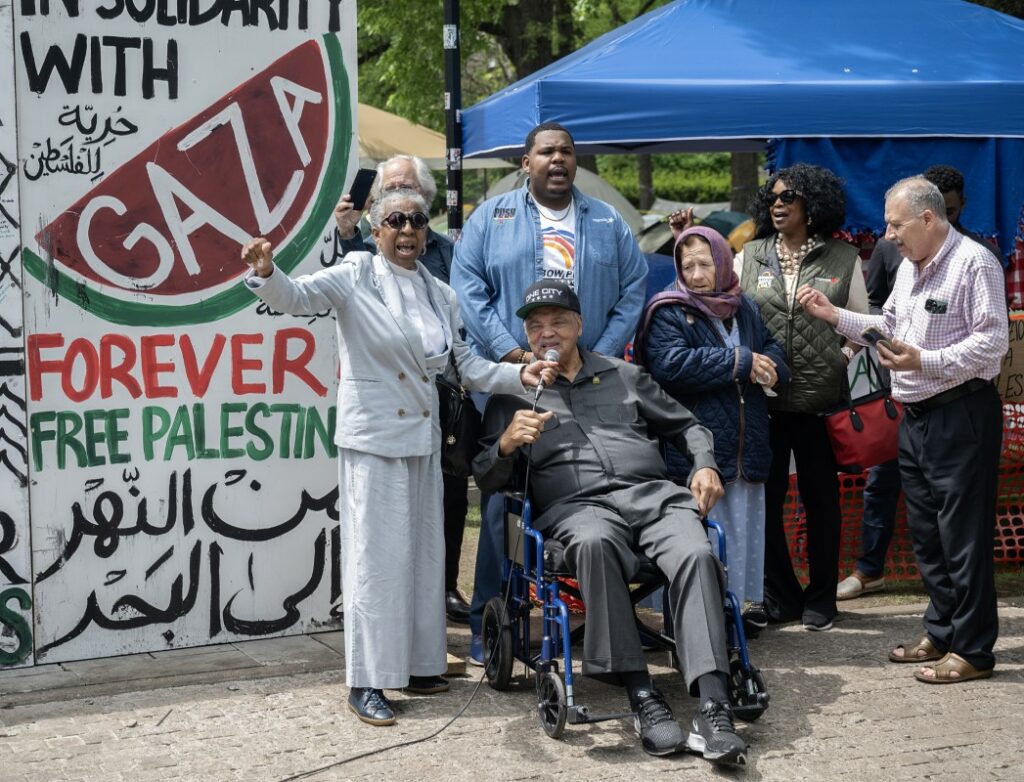
Lukas, an organizer with the anti-war organization Dissenters, told the Weekly that the meaning behind occupying the quad is to reclaim space from the university. He said organizers were following the example of the Indian Village Movement in the 1970s that set up large encampments to demand the U.S. honor Native treaties.
“When you talk to faculty, when you talk to students… they don’t want their employer to be paying for bombs [or] to be invested in General Dynamics [and] to be invested in fossil fuels. The people who want that are upper level university administrators,” Lukas said. “I think this space is really reminding the university that this university does belong to the students. It does belong to the faculty. It does not belong to the people who manage our endowment.”
In addition to tents for shelter, others were equipped to perform normal day-to-day public functions such as a medic tent, a tent with bathroom supplies, and a tent that represented a welcome center. A small library was set up along the margins of the camp.
“When we imagine what this space can be, it points out all that it isn’t. When we imagine what it’s like to create student-to-student infrastructure, to care for each other, it shows how easy it would be for the university to do so,” Lukas said. “And how absurd it is that they continually won’t… In creating this space, we show how feasible it is [and] how possible it is. A better world is possible and it’s valuable to take space to try to experiment. In theory, that is the point of the university.”
At a May 6 press conference, members of FJP at U. of C. urged administrators to engage in “good-faith” negotiation with students and not to resort to the use of police. They also called out administrators for what they called a selective deployment of the Kalven Report.
Faculty members expressed concerted support for their students and reiterated their commitment to defending them for as long as they speak out against the “ongoing Israeli genocide” of Palestinian people.
“There are multiple teach-ins occurring every day. University community members are going there to learn about the horrifying events unfolding every day in Gaza,” said Faith Hillis, a professor of the history department and member of the Greenberg Center for Jewish Studies. “And in fact, as a result of this encampment, I’ve seen more students and faculty conversing in a deep way, and working together than I ever have before. Numerous of my faculty colleagues have commented that they feel they are learning more from our students than we can possibly ever teach them.”
Jessica Darrow, a professor in the university’s School of Social Work, Policy, and Practice, said the student encampment was a form of hands-on learning.
“When [the students] choose to stand up for what they believe in, they’re applying the lessons of history, ethics, governance, and social justice that they have learned in our classrooms and from our texts,” she said. “They are not merely learning democracy, they’re doing democracy.
Kevin Hu is a multidisciplinary writer, tech worker, and a recent Chicago re-transplant.

